中医英语特点
中医英语词汇

中医英语词汇中医学是中国传统医学的一部分,拥有丰富的词汇和术语。
在全球范围内,中医学已经成为一门备受关注的学科。
为了更好地促进中医学的国际交流,以下是一些中医英语词汇的介绍。
1. 中医学 (Traditional Chinese Medicine, TCM): 中医学是通过整体观念和系统化的理论体系,对人体生理与病理进行分析和治疗的医学体系。
2. 阴阳 (Yin and Yang): 阴阳是中医学中的基本概念之一,代表了宇宙和万物中相互依存、相互对立、相互转化的两个相对方面。
在人体中,阴阳平衡是保持健康的基础。
3. 气 (Qi): 气是中医学中的重要概念,指的是生命活动中的能量。
气的流动和平衡对于身体健康至关重要。
4. 经络(Meridians): 经络是中医学中描述人体气血运行通路的概念。
通过调理经络可以调整身体的功能和气血流动。
5. 穴位 (Acupoints): 穴位是经络上的特定点位,通过刺激这些穴位可以改善身体的健康状况。
6. 中药 (Traditional Chinese Medicine, TCM): 中药是中医学中使用的草药、矿物和动物制品的总称。
中药通过调整身体的阴阳平衡和气血流动来治疗疾病。
7. 针灸 (Acupuncture): 针灸是中医学中常用的治疗方法,通过插入细针刺激穴位来调整身体的功能和气血流动。
8. 推拿 (Tuina): 推拿是一种中医学的按摩疗法,通过按摩经络和穴位来调节身体的气血流动,舒缓疼痛和改善健康。
9. 拔罐 (Cupping): 拔罐是中医学中常用的一种疗法,通过在皮肤上制造负压来促进血液循环和淋巴流动,增强身体的免疫力和代谢功能。
10. 艾灸 (Moxibustion): 艾灸是一种中医学的疗法,通过点燃艾草或艾条对穴位进行刺激,促进气血流动和身体的自愈能力。
以上只是中医学中部分重要词汇的介绍,中医学是一个复杂而庞大的学科,拥有非常丰富的文化内涵。
中医英语翻译特点略谈
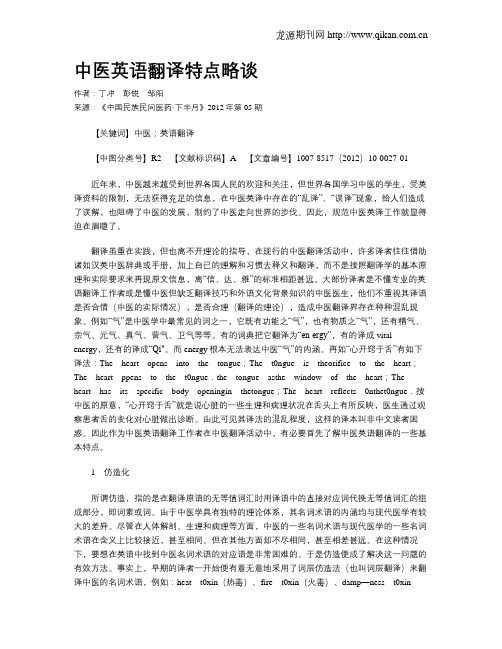
中医英语翻译特点略谈作者:丁冲彭锐邹阳来源:《中国民族民间医药·下半月》2012年第05期【关键词】中医;英语翻译【中图分类号】R2【文献标识码】A【文章编号】1007-8517(2012)10-0027-01近年来,中医越来越受到世界各国人民的欢迎和关注,但世界各国学习中医的学生,受英译资料的限制,无法获得充足的信息,在中医英译中存在的“乱译”、“误译”现象,给人们造成了误解,也阻碍了中医的发展,制约了中医走向世界的步伐。
因此,规范中医英译工作就显得迫在眉睫了。
翻译虽重在实践,但也离不开理论的指导,在现行的中医翻译活动中,许多译者往往借助诸如汉英中医辞典或手册,加上自已的理解和习惯去释义和翻译,而不是按照翻译学的基本原理和实际要求来再现原文信息,离“信、达、雅”的标准相距甚远。
大部份译者是不懂专业的英语翻译工作者或是懂中医但缺乏翻译技巧和外语文化背景知识的中医医生,他们不重视其译语是否合情(中医的实际情况),是否合理(翻译的理论),造成中医翻译界存在种种混乱现象。
例如“气”是中医学中最常见的词之一,它既有功能之“气”,也有物质之“气”,还有精气、宗气、元气、真气、营气、卫气等等。
有的词典把它翻译为“en-ergy”,有的译成vital energy,还有的译成“Qi"。
而energy根本无法表达中医“气”的内涵。
再如“心开窍于舌”有如下译法:The heart opens into the tongue;The t0ngue is theorifice to the heart;The heart ppens to the t0ngue.the tongue asthe window of the heart;The heart has its specific body openingin thetongue;The heart reflects0nthet0ngue.按中医的原意,“心开窍于舌”就是说心脏的一些生理和病理状况在舌头上有所反映,医生通过观察患者舌的变化对心脏做出诊断。
中医英语一 -回复 -回复

中医英语一-回复-回复中医(Traditional Chinese Medicine,TCM)是中国传统的医学体系,涵盖了中草药疗法、针灸、推拿等多种疗法和理论。
它与西方医学有着不同的观点和治疗方法。
首先,中医强调人体的整体性。
中医认为人体是一个有机的整体,不仅包括生理系统,还包括情绪、精神等方面。
因此,中医诊断和治疗时,会综合考虑患者的身体状况、生活习惯以及环境因素等,而不是只局限于症状和疾病本身。
其次,中医注重平衡和调节。
中医认为健康的状态是身体各个器官和系统之间的平衡状态,而疾病则是由于这种平衡被打破而产生的。
因此,中医治疗的目标是通过调整和平衡身体的阴阳、气血、脏腑等方面来恢复健康。
针对每个人的疾病情况,中医会制定个体化的治疗方案。
中医的诊断主要是通过四诊法,包括望诊(观察患者的外表和面色)、闻诊(听取患者的声音和气味)、问诊(询问患者的症状和病史)以及切诊(通过触摸患者的脉搏来判断疾病情况)。
根据这些诊断结果,中医医生会选择适合患者个体特点的治疗方法,如草药、针灸、拔罐、艾灸等。
中医的治疗方法通常比较温和和细致,强调对疾病的早期干预和调理。
这与西方医学治疗的常见做法有所不同,西方医学通常在疾病出现后才进行治疗,而中医则更关注疾病的预防和健康的保持。
中医在世界范围内越来越受到重视和认可。
一方面,中医疗法在一些慢性病、疼痛管理和康复方面表现出良好效果,受到患者的欢迎。
另一方面,中医不仅是中国传统文化的重要组成部分,也是中国的非物质文化遗产之一,对于世界各国的人们来说,了解并学习中医文化,也是对中国文化的一种了解和尊重。
然而,中医也面临一些挑战和争议。
一方面,中医理论和诊疗方法缺乏科学性和证据支持,容易导致误诊和误治;另一方面,由于草药的副作用和使用不当可能产生的风险,中药的安全性一直是一个关注焦点。
综上所述,中医作为中国传统的医学体系,在世界各地有着广泛的影响和应用。
尽管中医的理论和疗法与西方医学有所不同,并且也存在一些争议和挑战,但中医文化的传承和中医疗法在人们健康管理中的角色仍然是不可否认的。
中医药文化英文版
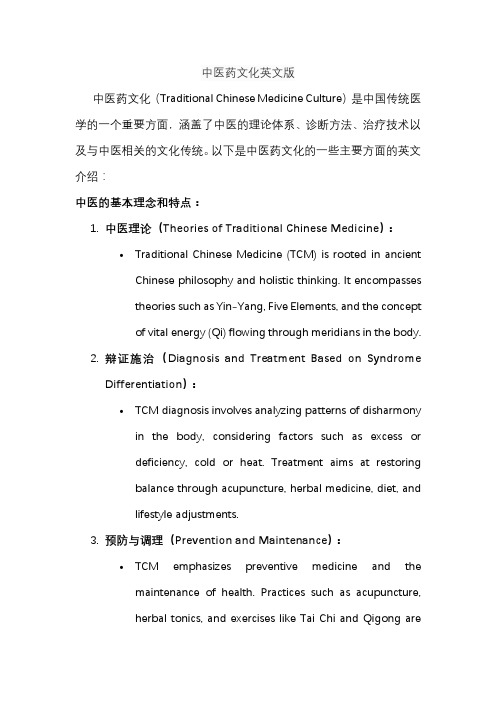
中医药文化英文版中医药文化(Traditional Chinese Medicine Culture)是中国传统医学的一个重要方面,涵盖了中医的理论体系、诊断方法、治疗技术以及与中医相关的文化传统。
以下是中医药文化的一些主要方面的英文介绍:中医的基本理念和特点:1.中医理论(Theories of Traditional Chinese Medicine):•Traditional Chinese Medicine (TCM) is rooted in ancient Chinese philosophy and holistic thinking. It encompassestheories such as Yin-Yang, Five Elements, and the conceptof vital energy (Qi) flowing through meridians in the body.2.辩证施治(Diagnosis and Treatment Based on SyndromeDifferentiation):•TCM diagnosis involves analyzing patterns of disharmony in the body, considering factors such as excess ordeficiency, cold or heat. Treatment aims at restoringbalance through acupuncture, herbal medicine, diet, andlifestyle adjustments.3.预防与调理(Prevention and Maintenance):•TCM emphasizes preventive medicine and the maintenance of health. Practices such as acupuncture,herbal tonics, and exercises like Tai Chi and Qigong areused to strengthen the body's natural defenses.中医的诊断与治疗方法:1.脉诊与舌诊(Pulse and Tongue Diagnosis):•TCM practitioners assess the pulse and examine the tongue to gather information about the patient's internalcondition, including the state of organs and energy flow.2.针灸疗法(Acupuncture):•Acupuncture involves inserting thin needles into specific points on the body to regulate the flow of Qi and restorebalance. It is widely used for pain management andvarious health conditions.3.中药治疗(Herbal Medicine):•Herbal medicine uses a combination of plants, minerals, and animal products to create formulas tailored toindividual patient needs. These formulas aim to addressthe root causes of illnesses.中医文化的历史与发展:1.源远流长(Ancient Roots):•Traditional Chinese Medicine has a history of over 2,500 years. It has evolved through the contributions ofnumerous physicians and scholars, and its theories andpractices continue to be refined.2.现代中医(Modern Developments):•In modern times, TCM has gained recognition worldwide.It integrates with Western medicine in China's healthcaresystem, and acupuncture and herbal medicine arepracticed globally as complementary therapies.3.文化传承(Cultural Heritage):•TCM is not only a system of medicine but also a cultural heritage. It includes practices like Tai Chi and Qigong, aswell as dietary principles based on balance and harmony. 中医文化的影响:1.全球传播(Global Influence):•Traditional Chinese Medicine has gained popularity worldwide, with acupuncture clinics, herbal medicineshops, and TCM wellness practices found in manycountries.2.中医与现代医学的互动(Integration with Modern Medicine):•TCM and Western medicine often complement each other.Many patients seek TCM for chronic conditions, painmanagement, and overall well-being alongsideconventional medical treatments.这些简要的介绍涵盖了中医药文化的一些关键方面。
中医英语翻译的特点、问题及原则【lunwen+开题+综述】
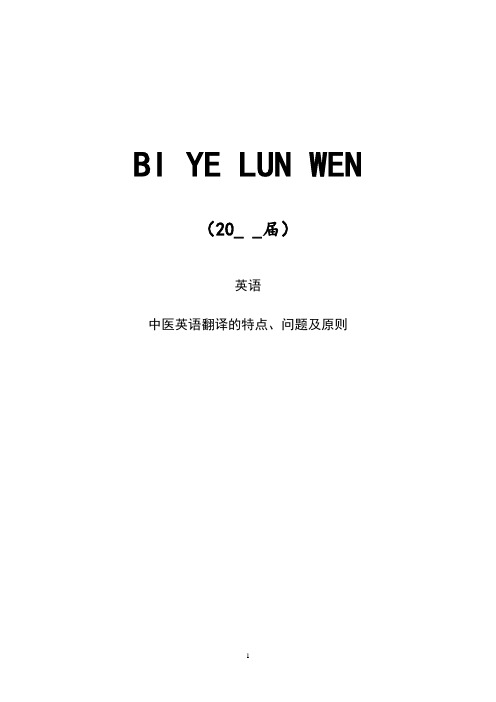
BI YE LUN WEN(20_ _届)英语中医英语翻译的特点、问题及原则ContentsAbstract (4)1 Introduction (5)2 The Development of the English Translation of Traditional Chinese Medicine . 62.1 The first developing stage (6)2.2 The second developing stage (6)2.3 The third developing stage (7)2.4 The fourth developing stage (7)2.5 The fifth developing stage (8)3 The Characteristics of the English Translation of Traditional Chinese Medicine (9)3.1 Word coping (9)3.2 Giving definition (10)3.3 Diversified translations (10)4 The Existing Problems of the English Translation of Traditional Chinese Medicine (11)4.1 Lack of translated words (12)4.2 The deviation of understanding (13)5 The Principles of the English Translation of Traditional Chinese Medicine (14)5.1 Focusing on the meaning while losing the form (14)5.2 Contrasting the western medicine, seeking common ground while reservingdifference (16)5.3 Respecting national conditions, maintaining characteristics (17)6 Conclusion (18)Bibliography (20)Acknowledgements (21)摘要随着时代的前进,国内外人士越来越注重健康,这也使得医学得到不断得发展。
医学英语的词汇特点

医学英语的词汇特点医学英语是一个特殊的语言领域,因为它具有一些独特的词汇特点。
本文将分步骤阐述医学英语的词汇特点。
一、术语化医学英语词汇的首要特点是术语化。
也就是说,这些词汇通常是特定行业中所使用的术语,它们经过长时间的共识和使用,已经被标准化了。
这些词汇相对于日常英语词汇,更加精确、精细,用于准确地描述医学概念和情况。
例如,胃的医学术语是“gastric”,而不是一般的“stomach”。
如果在医学文献中使用“stomach”,将无法准确描述胃相关的问题。
二、拼写和发音医学英语的词汇特点之一是许多术语拼写和发音都很复杂。
这是因为许多词汇来自于拉丁语和希腊语,并且这些词汇在过去的时代中是科学家、医生等专业人士所使用的。
随着时间的推移,这些术语被传承下来,并在今天的医学界中被广泛使用。
例如,“pulmonology”这个词汇的拼写和发音都很复杂,但是在医学英语中是一个常见的术语,描述与肺相关的诊断和治疗。
三、缩略语医学英语常常使用缩略语来称呼某些词汇,也是一种非常普遍的语言特点。
因为许多医学术语非常长,使用缩略语可以更方便地描述疾病或药物。
然而,要记住的单词数很多,所以需要经过一定的学习。
例如,“CNS”代表中枢神经系统,它的缩写方便了医学专业人员的书写和交流。
四、词源学医学英语中很多词汇都有希腊语或拉丁语的前缀、后缀或词根。
这是因为历史上这两种语言是科学和医学文献的主要语言,所以医学英语中有很多的古典词源。
例如,“neurology”来自希腊语“neuron”,意思是神经。
这样的词源在医学英语中非常常见。
总之,医学英语有其特殊的词汇特点,术语化、复杂的拼写和发音、缩略语和词源学都是医学术语的特点。
学生尤其是医学专业的学生需要特别重视医学英语的学习,这可以帮助他们更好地理解和掌握医学知识,同时也方便了与其他同行的交流。
中医英语

翻译短语1.中国医药学traditional Chinese medicine; TCM2.中医基础理论basic theory of TCM3.临床经验clinical experience4.辨证论治treatment based on syndrome differentiation5.中药学Chinese pharmacy6.针灸acupuncture and moxibustion7.病因学etiology8.方剂prescription; formula9.滋阴降火nourishing yin and reducing fire10.六腑six fu-organs11.整体观念holism12.社会属性social attribute13.诊断学diagnostics14.邪正关系relationship between pathogenic factors and healthy qi 15.治疗学therapeutics16.风寒感冒common cold due to wind and cold17.同病异治treatment of the same disease with different remedies 18.异病同治treatment of different diseases with the same remedy19.疾病本质nature of disease20.相互转化 mutual transformation21.寒极生热 extreme cold turning into heat22.相互消长 mutual wane-wax23.相互制约 mutual restriction24.相互依存 interdependence25.五行学说the doctrine of five elements26.相乘相侮subjugation and counter-restriction27.土虚木乘deficient earth being subjugated by wood28.生克制化inhibition-development with generation and restriction 29.母病及子 involvement of a child- organ by its mother-organ disorder 30.藏象学说doctrine of visceral manifestations31.奇恒之腑extraordinary fu-organs32.水谷精微essence of water and food33.临床实践clinical practice34.藏而不泻storage without discharge/excretion35.心气充沛sufficiency of heart qi36.血液充盈sufficiency of blood37.汗血同源sweat and blood sharing the same origin38.脾主运化the spleen governing transportation and transformation39.后天之本origin of acquired constitution40.奇恒之腑extraordinary fu-organs41.上焦upper energizer42.泌别清浊separating the lucid from the turbid43.初步消化 primary digestion44.月经来潮occurrence of menstruation45.先天禀赋innateness46.水液代谢water metabolism47.气机调畅smoothness of qi movement48.气机qi movement49.气化qi transformation50.先天之气innate qi51.后天之气acquired qi52.气生血qi generating blood53.气行血qi propelling blood54.津血同源body fluid and blood sharing the same origin55.气为血帅,血为气母Qi serves as commander of blood and blood does as mother of qi 56.益气固脱nourishing qi to stop collapse57.经络学说meridian theory58.经络系统meridian system59.十二正经twelve regular meridians60.奇经八脉eight extraordinary meridians61.十二经别twelve meridians’ divergences62.外感六淫six exogenous pathogenic factors63.风邪外袭pathogenic wind attacking the exterior64.感受寒邪attack/invade by pathogenic cold65.阴虚生内热production of endogenous heat due to yin deficiency66.七情内伤internal impairment due to seven emotions67.体质强弱 (body )constitutional state68.五心烦热feverish sensation in the five centers (palms, soles, and chest) 69.五志过极extreme changes of five emotions70.阴阳互损mutual involvement of yin and yang71.精充气足 sufficient essence and abundant qi72.肌肤甲错squamous and dry skin73.预后良好favorable prognosis74.脉象pulse conations75.表里同病disease involving both exterior and interior76.寒热错杂co-existence of cold and heat/ mixture of cold and heat77.真寒假热true cold with false heat78.寒证化热cold syndrome transforming into heat one79.热证转寒transformation of heat syndrome into cold one80.潮热盗汗tidal fever and night sweating81.中草药Chinese medicinal herbs82.四气五味four properties and five flavors83.燥湿健脾drying dampness to invigorate the spleen84.升降沉浮ascending, descending, sinking and floating85.归经channel tropism of medicines86.用药禁忌medication contraindication87.方剂学science of prescription88.方剂的加减modification of a prescription89.剂型与剂量drug form and dosage90.药物毒性toxicity of medicinal herb91.引经报使guiding action92.药物饮片 herbal slice93.针灸疗法acupuncture and moxibustion (therapy)94.针刺补泻reinforcing and reducing95针刺止痛analgesia by acupuncture96.针刺麻醉acupuncture anesthesia97.耳针疗法ear acupuncture (therapy)98.提插捻转lifting, thrusting, twisting and rotating (techniques)翻译句子1.中国医药学有数千年的历史,是中国人民长期同疾病作斗争的经验总结。
医学英语的特点
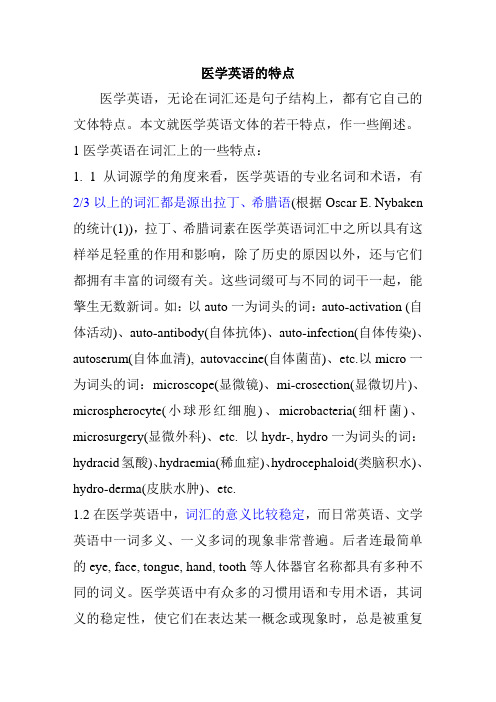
医学英语的特点医学英语,无论在词汇还是句子结构上,都有它自己的文体特点。
本文就医学英语文体的若干特点,作一些阐述。
1医学英语在词汇上的一些特点:1. 1从词源学的角度来看,医学英语的专业名词和术语,有2/3以上的词汇都是源出拉丁、希腊语(根据Oscar E. Nybaken 的统计(1)),拉丁、希腊词素在医学英语词汇中之所以具有这样举足轻重的作用和影响,除了历史的原因以外,还与它们都拥有丰富的词缀有关。
这些词缀可与不同的词干一起,能擎生无数新词。
如:以auto一为词头的词:auto-activation (自体活动)、auto-antibody(自体抗体)、auto-infection(自体传染)、autoserum(自体血清), autovaccine(自体菌苗)、etc.以micro一为词头的词:microscope(显微镜)、mi-crosection(显微切片)、microspherocyte(小球形红细胞)、microbacteria(细杆菌)、microsurgery(显微外科)、etc. 以hydr-, hydro一为词头的词:hydracid氢酸)、hydraemia(稀血症)、hydrocephaloid(类脑积水)、hydro-derma(皮肤水肿)、etc.1.2在医学英语中,词汇的意义比较稳定,而日常英语、文学英语中一词多义、一义多词的现象非常普遍。
后者连最简单的eye, face, tongue, hand, tooth等人体器官名称都具有多种不同的词义。
医学英语中有众多的习惯用语和专用术语,其词义的稳定性,使它们在表达某一概念或现象时,总是被重复使用。
如change dressings(换敷料),goose flesh(鸡皮疙瘩),contrast medium(造影剂),blue spot(青斑),peptic ulcer(消化性溃疡),whooping cough(百日咳)等。
中医和西医的优缺点英语作文
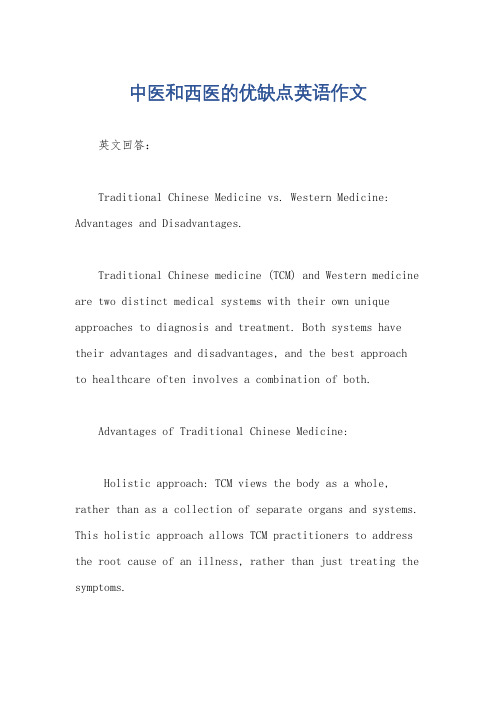
中医和西医的优缺点英语作文英文回答:Traditional Chinese Medicine vs. Western Medicine: Advantages and Disadvantages.Traditional Chinese medicine (TCM) and Western medicine are two distinct medical systems with their own unique approaches to diagnosis and treatment. Both systems have their advantages and disadvantages, and the best approach to healthcare often involves a combination of both.Advantages of Traditional Chinese Medicine:Holistic approach: TCM views the body as a whole, rather than as a collection of separate organs and systems. This holistic approach allows TCM practitioners to address the root cause of an illness, rather than just treating the symptoms.Emphasis on prevention: TCM focuses on preventing illness through lifestyle changes, such as dietary modifications, exercise, and stress management. This emphasis on prevention can help to keep people healthy and reduce the risk of chronic diseases.Natural remedies: TCM practitioners often use natural remedies, such as herbs, acupuncture, and massage, to treat illness. These remedies are typically gentle and have minimal side effects.Cultural significance: TCM is deeply rooted in Chinese culture, and many people find comfort and healing in its traditional practices.Disadvantages of Traditional Chinese Medicine:Lack of scientific evidence: Some TCM treatments lack scientific evidence to support their effectiveness. This can make it difficult to determine which treatments are truly effective and which are not.Potential for interactions with Western medications: Some TCM herbs can interact with Western medications, which can lead to serious health problems. It is important to inform your doctor if you are taking any TCM remedies.Limited availability: TCM practitioners are not as widely available as Western doctors, especially in Western countries. This can make it difficult to access TCM care.Advantages of Western Medicine:Scientific basis: Western medicine is based onscientific research and evidence-based practices. This ensures that treatments are effective and safe.Advanced technology: Western medicine has access to advanced technology, such as MRI machines, CT scanners, and surgical robots. This technology allows doctors to diagnose and treat diseases with greater precision and accuracy.Emergency care: Western medicine is well-equipped to handle emergency situations, such as heart attacks, strokes,and accidents. This can save lives and prevent serious complications.Wide availability: Western doctors are widelyavailable in most countries, making it easy to access care.Disadvantages of Western Medicine:Fragmentation: Western medicine often focuses on treating specific symptoms or diseases, rather than the whole person. This fragmentation can lead to fragmented care and a lack of coordination between different healthcare providers.Expensive: Western medicine can be expensive, especially for complex or chronic conditions. This can make it difficult for some people to afford the care they need.Side effects: Western medications can have side effects, which can range from mild to severe. It is important to discuss the potential side effects of any medication with your doctor before taking it.Conclusion:Traditional Chinese medicine and Western medicine offer different approaches to healthcare with their own advantages and disadvantages. The best approach to healthcare often involves a combination of both systems. By understanding the strengths and weaknesses of each system, you can make informed decisions about your healthcare and choose the best approach for your individual needs.中文回答:中医和西医的优缺点。
《新编实用医学英语教程》中医学英语常见语言特点的分析

《新编实用医学英语教程》中医学英语常见语言特点的分析作者:梁静来源:《校园英语·下旬》2014年第09期医学英语是我国高等医学院校教育的重要组成部分,医学英语课程的教学目的,即要求学生以医学英语为语言工具,具备专业知识的获取能力和所需信息的交流能力,学术报告论文摘要等的写作能力,英汉翻译技能以及参加学术交流和医学实践的听说能力要培养学生具备这几方面的能力。
医科院校学生在学完《新视野大学英语》一至四册后,将进行医学英语的学习,笔者结合我院使用的李永安教授主编的教材《新编实用医学英语教程》对医学英语中常见的语言特点,从词汇、语法和文体修辞角度引用例句做一个简要的分析。
一、从词汇角度分析1.医学英语大量使用了来源于希腊语和拉丁语的医学术语。
由于古希腊与古罗马文化曾先后对医学的发展产生过巨大的影响,而且希腊语与拉丁语词汇丰富,词汇意义单一,构词原则简单,构词能力较强,所以我们今天所见到的绝大多数医学英语术语都是由希腊语词素和拉丁语词素合成的。
来源于希腊语和拉丁语的医学英语术语具有以下两个方面的特点:直接来源于希腊语和拉丁语的医学专业词汇,仍然保留了希腊语和拉丁语的原型,例如来自拉丁语的词汇: cerebrum(大脑)、uterus(子宫)、stupor(昏迷)等;来自希腊语的词汇: thorax(胸)、pharynx (咽)、stasis(停滞)等。
利用希腊语和拉丁语的词素(词根或词缀)通过派生的方法组合成医学术语,这些派生词在医学英语词汇中数量最多,例如: electrocardiogram (心电图,electro-电, cardio-心,-gram 图)、bactericide (杀菌剂, bacterio-细菌,-cide 杀)、hypertension (高血压,hyper-高,-tension 紧张)、uterography (子宫造影术, utero-子宫,-graphy 造影术)等。
中医英语翻译的特点
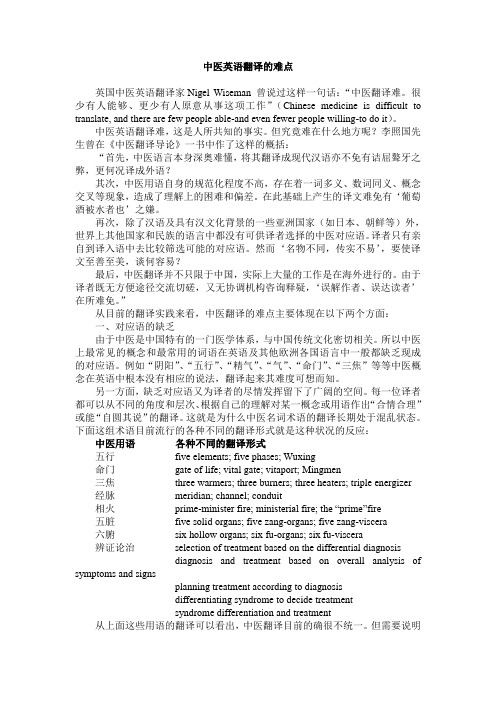
中医英语翻译的难点英国中医英语翻译家Nigel Wiseman 曾说过这样一句话:“中医翻译难。
很少有人能够、更少有人原意从事这项工作”(Chinese medicine is difficult to translate, and there are few people able-and even fewer people willing-to do it)。
中医英语翻译难,这是人所共知的事实。
但究竟难在什么地方呢?李照国先生曾在《中医翻译导论》一书中作了这样的概括:“首先,中医语言本身深奥难懂,将其翻译成现代汉语亦不免有诘屈聱牙之弊,更何况译成外语?其次,中医用语自身的规范化程度不高,存在着一词多义、数词同义、概念交叉等现象,造成了理解上的困难和偏差。
在此基础上产生的译文难免有‘葡萄酒被水者也’之嫌。
再次,除了汉语及具有汉文化背景的一些亚洲国家(如日本、朝鲜等)外,世界上其他国家和民族的语言中都没有可供译者选择的中医对应语。
译者只有亲自到译入语中去比较筛选可能的对应语。
然而‘名物不同,传实不易’,要使译文至善至美,谈何容易?最后,中医翻译并不只限于中国,实际上大量的工作是在海外进行的。
由于译者既无方便途径交流切磋,又无协调机构咨询释疑,‘误解作者、误达读者’在所难免。
”从目前的翻译实践来看,中医翻译的难点主要体现在以下两个方面:一、对应语的缺乏由于中医是中国特有的一门医学体系,与中国传统文化密切相关。
所以中医上最常见的概念和最常用的词语在英语及其他欧洲各国语言中一般都缺乏现成的对应语。
例如“阴阳”、“五行”、“精气”、“气”、“命门”、“三焦”等等中医概念在英语中根本没有相应的说法,翻译起来其难度可想而知。
另一方面,缺乏对应语又为译者的尽情发挥留下了广阔的空间。
每一位译者都可以从不同的角度和层次、根据自己的理解对某一概念或用语作出“合情合理”或能“自圆其说”的翻译。
这就是为什么中医名词术语的翻译长期处于混乱状态。
浅析中医英语的词汇特点和翻译技巧
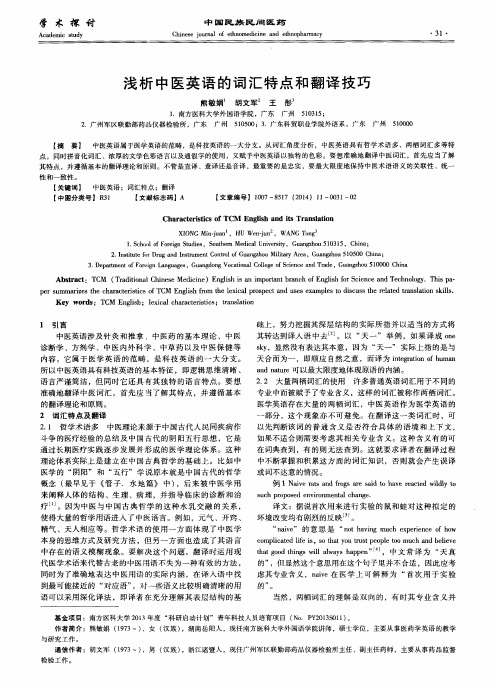
A b s t r a c t :T C M ( T r a d i t i o n a l C h i n e s e Me d i c i n e )E n g l i s h i s a n i m p o r t a n t b r nc a h o f E n g l i s h f o r S c i e n c e a n d T e c h n o l o g y . T h i s p a —
的 翻译 理 论 和 原 则 。 2 词 汇 特 点 及 翻 译
a n d n a t u r e可 以最大 限度地体 现原语 的内涵 。 2 . 2 大量两 栖词 汇的使用 许 多普通英语 词汇用于不 同的
专业 中而被赋 予了专业 含义 ,这样 的词汇被称作 两栖词汇 。
【 关键词 】 中医英语 ;词汇特点 ;翻译
【 中图分类号 】R 3 1 【 文献标志码】A 【 文章编 号】1 0 0 7 — 8 5 1 7( 2 0 1 4 )1 1 — 0 0 3 1 — 0 2
Ch a r a c t e r i s t i c s o f TCM En g l i s h a n d i t s Tr a n s l a t i o n
XI O NG Mi n - j u n。 a ,H U We n - j n ,WAN a G T o n g 3
1 . S c ho o l o f F o r e i g n S t u d i e s ,S o u t h e r n Me d i c a l Un i v e r s i t y, Gu a n g z h o u 5 1 0 3 汇 特 点 和 翻 译 技 巧
熊敏娟 胡文军 王
浅谈中医英语的翻译原则
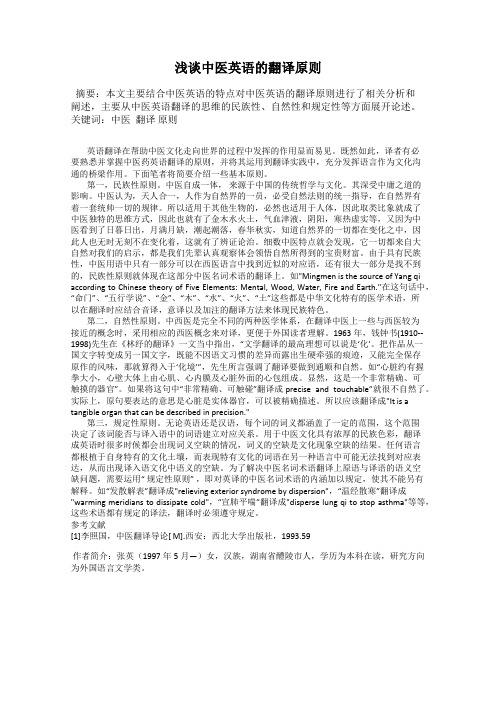
浅谈中医英语的翻译原则摘要:本文主要结合中医英语的特点对中医英语的翻译原则进行了相关分析和阐述,主要从中医英语翻译的思维的民族性、自然性和规定性等方面展开论述。
关键词:中医翻译原则英语翻译在帮助中医文化走向世界的过程中发挥的作用显而易见。
既然如此,译者有必要熟悉并掌握中医药英语翻译的原则,并将其运用到翻译实践中,充分发挥语言作为文化沟通的桥梁作用。
下面笔者将简要介绍一些基本原则。
第一,民族性原则。
中医自成一体,来源于中国的传统哲学与文化。
其深受中庸之道的影响。
中医认为,天人合一,人作为自然界的一员,必受自然法则的统一指导,在自然界有着一套统帅一切的规律。
所以适用于其他生物的,必然也适用于人体,因此取类比象就成了中医独特的思维方式,因此也就有了金木水火土,气血津液,阴阳,寒热虚实等,又因为中医看到了日暮日出,月满月缺,潮起潮落,春华秋实,知道自然界的一切都在变化之中,因此人也无时无刻不在变化着,这就有了辨证论治。
细数中医特点就会发现,它一切都来自大自然对我们的启示,都是我们先辈认真观察体会领悟自然所得到的宝贵财富。
由于具有民族性,中医用语中只有一部分可以在西医语言中找到近似的对应语,还有很大一部分是找不到的,民族性原则就体现在这部分中医名词术语的翻译上。
如"Mingmen is the source of Yang qi according to Chinese theory of Five Elements: Mental, Wood, Water, Fire and Earth."在这句话中,“命门”、“五行学说”、“金”、“木”、“水”、“火”、“土”这些都是中华文化特有的医学术语,所以在翻译时应结合音译,意译以及加注的翻译方法来体现民族特色。
第二,自然性原则。
中西医是完全不同的两种医学体系,在翻译中医上一些与西医较为接近的概念时,采用相应的西医概念来对译,更便于外国读者理解。
中医英语笔记

中医英语笔记-中基中医英语翻译特点:1.借用英语中已有单词的重新排列组合向英语语言输入中医特有的概念和表达法肝血Liver blood血虚Blood deficiency活血化瘀Activating blood to resolve stasis恶风aversion to wind倦怠fatigue and lack of strength肝气犯胃Liver-Qi invading the stomach2.定义化:用英语给予中医概念下定义辨证论治treatment based on syndrome, or syndrome differentiation and treatment奔豚a syndrome characterized by a feeling of gas rushing up through the throat to throat from the lower abdomen虚胀deficiency –flatulence3。
多样化:虚:Deficiency, asthenia, insufficiency, weakness, debility, hypofunction4.拼音化:Tuina中医英语翻译原则由于素体脾胃虚弱,或久病失血伤阴,致阴血不足,胞脉失养。
The disease results from chronic splenogastric asthenia, or yin-consumption by bleeding with chronic illness, leading to hemopenia and failure to nourish the uterine collaterals.如果气化功能失常,就会影响到气、血、津液的新陈代谢,影响饮食物的消化吸收,影响汗液、尿液和粪便的排泄,从而形成各种各样代谢异常的疾病。
The disorder of Qi activity can affect the metabolism of Qi, blood and body fluid, impair the digestion and absorption of food, and inhibit sweating, urination and defecation, resulting in various metabolic diseases.三焦, 现统一为triple energizerTranslation of TCM terminology补:tonify, invigorate, strengthen, supplement实火:Excessive fire, Solid fire温病:Seasonal febrile disease哮喘:Dyspnea and asthmatic breathing引火归原: conduct the fire returning to the original place肺痨: consumptive disease of the lung黄帝内经:yellow emperor’s canon of internal medicineThe theory of Yinyang and Five-elementsPlain questions《素问》Miraculous Pivot 《灵枢经》Classic on Medical Problems 《难经》Shen Nong’s Herbal《神农本草经》Treatise on Febrile Diseases《伤寒论》Synopsis of Prescriptions of Golden Cabinet 《金匮要略》A-B Classic of Acupuncture and Moxibustion《针灸甲乙经》General Treatise on the Etiology and Symptomsology《诸病源候论》Theory of TCMMaterialism 唯物主义疾病可知又可防治The diseases are cognizable and curableDialectics 辩证法正气存内,邪不可干When there is sufficient healthy qi inside, pathogenic factors have no way to invade the bodyBasic characteristics of TCM整体观念The holistic concept ;the concept of the organism as a wholeThe concept of organic whole refers to the integral unity of the human body and its close relationship with the outer world.从阳引阴,从阴引阳,以左治右,以右治左Drawing yin from yang and drawing yang from yin; treating the right for curing disease on the left and treating the left for curing disease on the right. 辨证论治Syndrome differentiation and treatment同病异治Treating the same disease with different therapies异病同治Treating different disease with the same therapy阴阳五行学说部分阴阳学说Theory of yin and yang or doctrine of yin and yang阴中之阴与阳中之阳Yin within yin and yang within yang阴阳互根Yin and yang are rooted in each other阴阳转化Yin-yang conversion阴阳自和Natural harmony of yin and yang;spontaneous harmonization of yin and yang阴阳消长Growth and decline between yin and yang阴平阳秘Yang steadies while yin calms ;calm yin and sound yang阴阳两虚Simultaneous asthenia of yin and yang,国外译作dual vacuity of yin and yang阴阳离绝Dissociation or separation of yin and yang阴胜则寒Excessive of yin causing cold or predominance of yin leads to cold syndrome阴损及阳Impairment of yin affecting yang or consumption of yin involving yang阴阳俱损Simultaneous impairment of yin and yang阴胜格阳Predominant yin rejecting yang or excessive yin repelling yangYin and Yang-the law of natureThings or phenomena which are dynamic, bright, hot, functional, etc, pertain to yang, while those that are static, dark, cold, substantial, etc, pertain to yinYin and yang are the law of heaven and earth, the principles of all things, the parents of all changes, the origin of life and deathThe content of the theory of Yin and YangOpposition n.反对, 敌对, 相反Interdependence n.互相依赖Relative waxing and waning 【医】消长变化Transformation 转化All things and phenomena in the natural world contain the two opposite components阴盛则阳病,…。
浅谈中医英语翻译的特点及难点
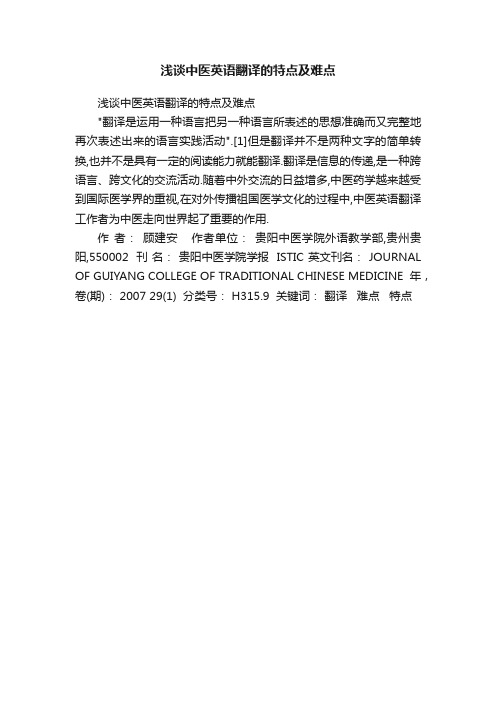
浅谈中医英语翻译的特点及难点
浅谈中医英语翻译的特点及难点
"翻译是运用一种语言把另一种语言所表述的思想准确而又完整地再次表述出来的语言实践活动".[1]但是翻译并不是两种文字的简单转换,也并不是具有一定的阅读能力就能翻译.翻译是信息的传递,是一种跨语言、跨文化的交流活动.随着中外交流的日益增多,中医药学越来越受到国际医学界的重视,在对外传播祖国医学文化的过程中,中医英语翻译工作者为中医走向世界起了重要的作用.
作者:顾建安作者单位:贵阳中医学院外语教学部,贵州贵阳,550002 刊名:贵阳中医学院学报 ISTIC 英文刊名: JOURNAL OF GUIYANG COLLEGE OF TRADITIONAL CHINESE MEDICINE 年,卷(期): 2007 29(1) 分类号: H315.9 关键词:翻译难点特点。
中医的特点英语作文
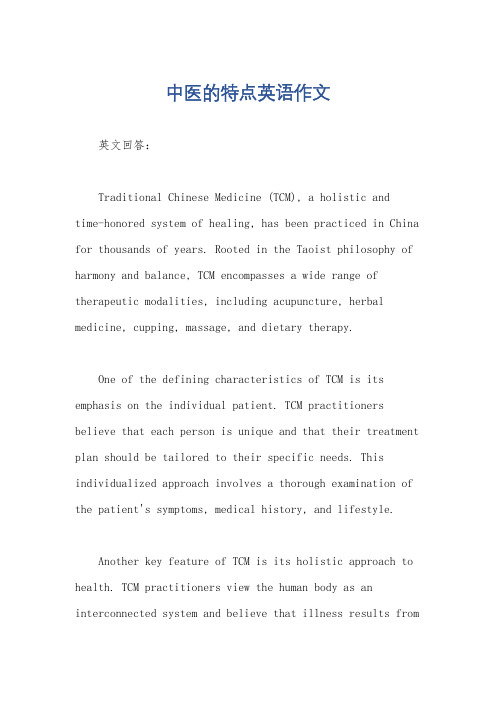
中医的特点英语作文英文回答:Traditional Chinese Medicine (TCM), a holistic andtime-honored system of healing, has been practiced in China for thousands of years. Rooted in the Taoist philosophy of harmony and balance, TCM encompasses a wide range of therapeutic modalities, including acupuncture, herbal medicine, cupping, massage, and dietary therapy.One of the defining characteristics of TCM is its emphasis on the individual patient. TCM practitioners believe that each person is unique and that their treatment plan should be tailored to their specific needs. This individualized approach involves a thorough examination of the patient's symptoms, medical history, and lifestyle.Another key feature of TCM is its holistic approach to health. TCM practitioners view the human body as an interconnected system and believe that illness results fromimbalances in the flow of qi (energy) and blood. Treatment, therefore, focuses on restoring these imbalances and promoting overall well-being.Acupuncture, a well-known TCM modality, involves the insertion of fine needles into specific points on the body. These needles are believed to stimulate qi and血(blood) flow, thereby relieving pain, improving circulation, and promoting relaxation.Herbal medicine is another important aspect of TCM. TCM practitioners use a vast array of herbs to treat a wide range of conditions. These herbs are often prescribed in combination to create formulas that are tailored to the individual patient.Cupping, a traditional Chinese therapy, involves placing heated cups on the skin to create suction. This suction is believed to draw out impurities, improve circulation, and relieve muscle tension.Massage is also commonly used in TCM. TCM massagetechniques are designed to promote relaxation, reduce stress, and improve circulation.Dietary therapy is an integral part of TCM. TCM practitioners believe that food can be used as medicine and that a balanced diet can help to prevent and treat illness. TCM dietary guidelines emphasize the consumption of whole, unprocessed foods and the avoidance of processed foods, sugary drinks, and excessive amounts of meat.In summary, Traditional Chinese Medicine is a holistic and individualized system of healing that emphasizes the individual patient, a holistic approach to health, and a wide range of therapeutic modalities, including acupuncture, herbal medicine, cupping, massage, and dietary therapy.中文回答:中医的特点:一、整体观:中医认为人体是一个有机的整体,脏腑经络相互联系,相互作用,共同维持机体的平衡。
中医的特点英语作文
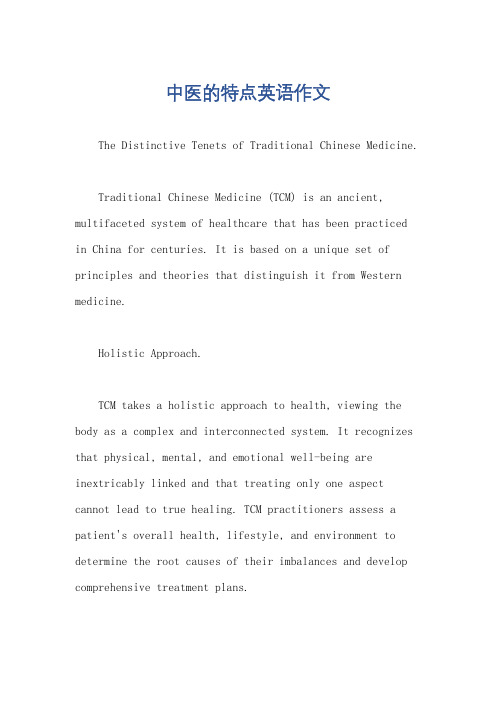
中医的特点英语作文The Distinctive Tenets of Traditional Chinese Medicine.Traditional Chinese Medicine (TCM) is an ancient, multifaceted system of healthcare that has been practicedin China for centuries. It is based on a unique set of principles and theories that distinguish it from Western medicine.Holistic Approach.TCM takes a holistic approach to health, viewing the body as a complex and interconnected system. It recognizes that physical, mental, and emotional well-being are inextricably linked and that treating only one aspect cannot lead to true healing. TCM practitioners assess a patient's overall health, lifestyle, and environment to determine the root causes of their imbalances and develop comprehensive treatment plans.Balance.Central to TCM philosophy is the concept of balance. The body is believed to be in a state of equilibrium when the opposing forces of yin and yang are in harmony. Yin represents the cold, dark, and passive aspects of the body, while yang represents the warm, bright, and active aspects. TCM treatments aim to restore this balance and maintain the body's natural homeostasis.Vital Energy (Qi)。
中医英语-中医的基本特点
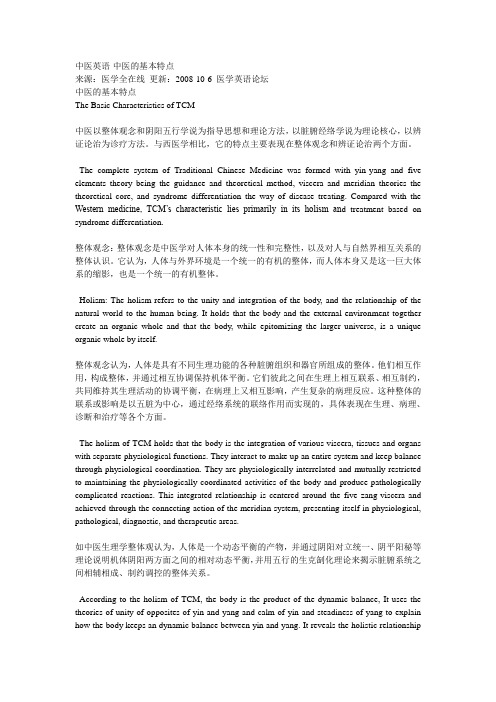
中医英语-中医的基本特点来源:医学全在线更新:2008-10-6 医学英语论坛中医的基本特点The Basic Characteristics of TCM中医以整体观念和阴阳五行学说为指导思想和理论方法,以脏腑经络学说为理论核心,以辨证论治为诊疗方法。
与西医学相比,它的特点主要表现在整体观念和辨证论治两个方面。
The complete system of Traditional Chinese Medicine was formed with yin-yang and five elements theory being the guidance and theoretical method, viscera and meridian theories the theoretical core, and syndrome differentiation the way of disease treating. Compared with the Western medicine, TCM’s characteristic lies primarily in its holism an d treatment based on syndrome differentiation.整体观念:整体观念是中医学对人体本身的统一性和完整性,以及对人与自然界相互关系的整体认识。
它认为,人体与外界环境是一个统一的有机的整体,而人体本身又是这一巨大体系的缩影,也是一个统一的有机整体。
Holism: The holism refers to the unity and integration of the body, and the relationship of the natural world to the human being. It holds that the body and the external environment together create an organic whole and that the body, while epitomizing the larger universe, is a unique organic whole by itself.整体观念认为,人体是具有不同生理功能的各种脏腑组织和器官所组成的整体。
- 1、下载文档前请自行甄别文档内容的完整性,平台不提供额外的编辑、内容补充、找答案等附加服务。
- 2、"仅部分预览"的文档,不可在线预览部分如存在完整性等问题,可反馈申请退款(可完整预览的文档不适用该条件!)。
- 3、如文档侵犯您的权益,请联系客服反馈,我们会尽快为您处理(人工客服工作时间:9:00-18:30)。
中医英语特点
中医英语(英语:Medical Chinese)是中医术语的英语表达方式,旨在促进中医的国际交流和传播。
中医英语具有以下特点:
1. 词汇丰富:中医涉及的疾病、症状、药物等词汇非常丰富,需要大量的专业词汇来表达。
2. 语义精确:中医的概念和理论比较独特,需要用精确的英语词汇来表达,以免造成误解。
3. 语法结构灵活:中医英语的语法结构比较灵活,有时需要采用被动语态、从句等复杂句型来表达。
4. 文化背景深厚:中医是中国传统医学的重要组成部分,其理论和实践都深深植根于中国传统文化,因此中医英语也具有深厚的文化背景。
总之,中医英语是一种专业性强、表达方式独特的语言,需要掌握一定的医学知识和英语表达能力才能更好地理解和运用。
